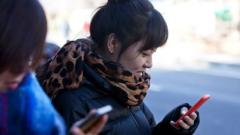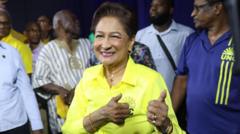In the span of just five months, South Korea finds itself in a political quagmire, with three different acting presidents having taken charge after the impeachment of the former elected leader. This political upheaval emanates from the abrupt declaration of martial law by the ousted president, Yoon Suk Yeol, and now as the country anticipates the presidential election on June 3, the populace is engulfed in doubt regarding the candidacy and legal standing of front-runner Lee Jae-myung from the Democratic Party. Adding complexity to the situation, Han Duck-soo, who recently resigned as prime minister and acting president, has announced his own presidential aspirations, contingent upon gaining the backing of the People Power Party, who are debating their candidate options. Han, who aligned closely with the impeached Yoon Suk Yeol, claims he can bridge the political divide and mitigate external pressures, specifically referencing challenges posed by U.S. tariffs. As uncertainty looms, citizens are left pondering the future leadership of their nation.
South Korea Faces Unprecedented Political Turmoil as Presidential Election Approaches

South Korea Faces Unprecedented Political Turmoil as Presidential Election Approaches
In a nation grappling with a constitutional crisis, South Korea's upcoming election casts a shadow of uncertainty over democracy.
South Korea Faces Unprecedented Political Turmoil as Presidential Election Approaches
In a nation grappling with a constitutional crisis, South Korea's upcoming election casts a shadow of uncertainty over democracy.
In the span of just five months, South Korea finds itself in a political quagmire, with three different acting presidents having taken charge after the impeachment of the former elected leader. This political upheaval emanates from the abrupt declaration of martial law by the ousted president, Yoon Suk Yeol, and now as the country anticipates the presidential election on June 3, the populace is engulfed in doubt regarding the candidacy and legal standing of front-runner Lee Jae-myung from the Democratic Party. Adding complexity to the situation, Han Duck-soo, who recently resigned as prime minister and acting president, has announced his own presidential aspirations, contingent upon gaining the backing of the People Power Party, who are debating their candidate options. Han, who aligned closely with the impeached Yoon Suk Yeol, claims he can bridge the political divide and mitigate external pressures, specifically referencing challenges posed by U.S. tariffs. As uncertainty looms, citizens are left pondering the future leadership of their nation.
In a nation grappling with a constitutional crisis, South Korea's upcoming election casts a shadow of uncertainty over democracy.
In the span of just five months, South Korea finds itself in a political quagmire, with three different acting presidents having taken charge after the impeachment of the former elected leader. This political upheaval emanates from the abrupt declaration of martial law by the ousted president, Yoon Suk Yeol, and now as the country anticipates the presidential election on June 3, the populace is engulfed in doubt regarding the candidacy and legal standing of front-runner Lee Jae-myung from the Democratic Party. Adding complexity to the situation, Han Duck-soo, who recently resigned as prime minister and acting president, has announced his own presidential aspirations, contingent upon gaining the backing of the People Power Party, who are debating their candidate options. Han, who aligned closely with the impeached Yoon Suk Yeol, claims he can bridge the political divide and mitigate external pressures, specifically referencing challenges posed by U.S. tariffs. As uncertainty looms, citizens are left pondering the future leadership of their nation.






















